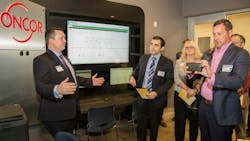Oncor Completes Microgrid
S&C Electric Co. and Schneider Electric have unveiled one of the most advanced microgrids in North America for Oncor. The microgrid is engineered to maximize newly installed energy storage, renewable generation and improve reliability. S&C teamed with Schneider Electric to combine new hardware and software technologies for the state-of-the-art facility, which includes an integrated demonstration center for Oncor to showcase the microgrid's advanced capabilities and customer benefits.
S&C and Schneider Electric built the microgrid at Oncor's System Operating Services Facility (SOSF) near Lancaster, Texas. The innovative system consists of four interconnected microgrids and utilizes nine different distributed generation sources, including two solar photovoltaic arrays, a microturbine, two energy storage units and four generators. To turn these diverse generation assets into a microgrid, S&C and Schneider Electric developed a distribution automation scheme that leverages multiple intelligent grid solutions from both companies—enabling the four microgrids to effectively operate independently or as one larger microgrid.
"Improving power reliability and optimizing generation assets requires disruptive technologies that allow customers to work on and off the grid," says David Chiesa, director, Microgrid Business Development, S&C. "Oncor's microgrid is showing the world how utilities can help their communities in the future."
During a loss-of-power event, a combination of S&C's advanced distribution automation equipment and Schneider Electric's Microgrid Controller (MGC) use high-speed communications and distributed grid intelligence to automatically detect a problem on the grid. It starts with S&C's IntelliRupter® PulseCloser™ fault interrupter which detects an interruption in power, tests to see if the issue is temporary or permanent, and if it is permanent dynamically islands the facility. The system then uses S&C's Scada-Mate™ CX Switches and Vista® Underground Distribution Switchgear to automatically re-configure the distribution system while the MGC autonomously switches to alternative distributed power sources. "It does all of this in a matter of seconds, or faster than a customer could find their flashlight in the dark," says Chiesa.
The energy storage systems are the backbone of the microgrid, which include S&C's PureWave® Community Energy Storage System. The onsite energy storage – which stores energy from either the utility feed or any of the facility's generation sources – provides the voltage signal for the site, enables renewable integration, controls the microgrid frequency and is the first generating source to respond during an unexpected loss of power.
The microgrid system also benefits from advanced grid technologies developed by Schneider Electric, including the PowerLogic® load preservation system, the microgrid controller and a new technology called StruxureWare™ Demand Side Operations (DSO). Schneider Electric's DSO model delivers economic optimization and dispatch of the microgrid distributed energy resources (DER), allowing the system to maximize renewable energy usage and storage while minimizing energy costs. DSO's innovative platform makes this possible by leveraging market pricing signals, weather and forecasting information, historical energy usage data and real-time building information.
To help educate and demonstrate the benefits of microgrids to residents, students, policymakers and businesses, S&C and Schneider Electric were asked to develop a microgrid demonstration facility on the SOSF campus. That facility will be known as Oncor's Technology Demonstration and Education Center (TDEC) and consists of two exhibits – an immersion room and a demonstration center. In the immersion room, the Oncor microgrid story is brought to life on seven screens for a full cinematic experience. The microgrid story highlights the history of the electric grid and the changes Oncor has made over time.
"Oncor has a rich history of working collaboratively with its vendor partners and this is a great opportunity to showcase those relationships in a state-of-the-art microgrid facility," says Michael Quinn, Oncor Chief Technology Officer.
The Center, which also serves as the SOSF microgrid control center, displays the new technology that Oncor is using on their system. The demonstration room features a fully functioning SCADA representation of the microgrid to show how the system reacts to a loss of power event such as extreme weather. Once an event is created, the switching devices respond accordingly, clearing the fault, isolating the faulted section and restoring service from an alternate source. The switching devices, controls, communications and software shown are all real and completely functional.
